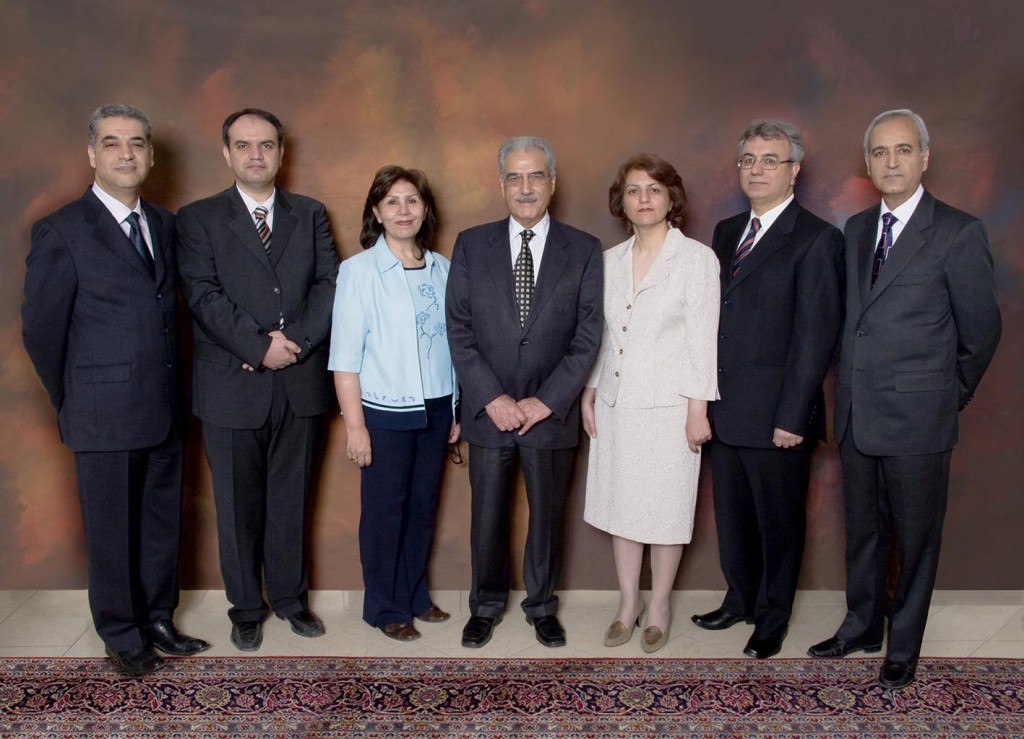Āl Maḥbūbah, Jaʻfar al-Shaykh Bāqir. Māḍī
al-Najaf wa-ḥāḍiruhā al-Najaf : Maṭbaʻat al-Ādāb, 1955-1958.
Amini, Muhammad Hadi, Muʻjam
rijāl al-fikr wa-al-adab fī al-Najaf khilāla alf ʻām Najaf? : s.n.,
1992
Amīnī, Muḥammad Hādī. Muʻjam al-maṭbūʻāt al-Najafīyah.
al-Najaf : Maṭbaʻat al-Ādāb, 1966
al-Asadi, Hasan Thaura
al-Najaf ‘ala al-inkliz, Baghdad: Wizarat al-I‘lam, 1975
Āṣafī, Muḥammad Mahdī. Madrasat al-Najaf wa-taṭawwur al-ḥarakah
al-iṣlāḥīyah fīhā. al-Najaf : [Dār al-Nuʻmān lil-Ṭibāʻah wa-al-Nashr, 1965]
Bahādilī, ʻAlī. al-Najaf : jāmiʻatuhā wa-dawruhā al-qiyādī Bayrūt,
Lubnān : Muʾassasat al-Wafāʾ, 1989.
Bahādlī, ʻAlī. al-Ḥawzah
al-ʻilmīyah fī al-Najaf : maʻālimuhā wa-ḥarakatuhā al-iṣlāḥīyah.
Bayrūt, Lubnān : Dār al-Zahrāʼ, 1993
Bahadli, Ahmad Kadhem. al-Najaf al-Ashraf wa Jama'taha al-Deenaiyya
Bahr al-‘Ulum, Introduction
to Amali Al-Shaykh Al-Tusi
Balāghī, ʻAbd al-Ḥujjat, Tārīkh-i Najaf-i ashraf va Ḥīrah Tehran,
Chāpkhāneh-yi Maẓāhirī, 1368 [1949
Dujaili, Ja'far Mousooa't al-Najaf al-Ashraf
(12 vol)
Faḍlī, ’Abd al-Hādī. Dalīl al-Najaf al-ashraf. 1966
Fakhr al-din, tarikh
al-najaf
Gharaviyān , Muḥsin. Ḥawzah
dar maʻraẓ-i hujūm : naqdī bar maqālah-ʾi. Qum : Daftar-i Nashr-i Barguzīdah,
[13]75 [1996]
Gharawī, Muḥammad. al-Ḥawzah al-ʻilmīyah fī al-Najaf al-ashraf
: dirāsah tārīkhīyah mutawāḍiʻah tabḥathu ʻan bidāyat al-jāmiʻah al-ʻilmīyah
al-dīnīyah fī al-Najaf al-ashraf Bayrūt, Lubnān : Dār al-Aḍwāʼ, 1994.
Gharawī, Muḥammad. Maʻa ʻulamāʾ al-Najaf al-ashraf Bayrūt, Lubnān : Dār al-Thaqalayn, 1999
Ḥakīm Hasan ʻĪsá, al-Mufaṣṣal
fī taʼrīkh al-Najaf al-Ashraf, Qum : al-Maktabah al-Ḥaydarīyah,
1427/2006
Al-Hakim, Muhammad Taqi, Da’ira
al-Ma ‘arif al-islamiyya al-Shi‘a, Beirut: al-Ta‘arif, 1986
Hāshimī al-Mashhadī, Muḥammad ʻAlī. al-Ḥawzah al-ʻilmīyah tudīn al-inḥirāf.
Bayrūt, Lubnān : Dār al-Ḥusaynī lil-Maṭbūʻāt, 2001.
Ḥassūn al-Burāqī, Ḥusayn
ibn al-Sayyid Aḥmad. Tārīkh al-Najaf :
al-maʻrūf bi, al-Yatīmah al-gharawīyah wa-al-tuḥfah al-Najafīyah fī al-arḍ
al-mubārakah al-zakīyah Bayrūt : Dār al-Muʾarrikh al-ʻArabī, 2009
Ibn shahrashub, mu’alam
al-ulama
Karbala center for research, najaf al-ashraf
Khalili, Jafar mausuat al-‘atabat al-muqadassah,
Baghdād, Dār al-Taʻāruf, 1965 (vol. 7 has info on madrasa and students. Also
look at section 7 vol. 2 for Bahr al-Ulum’s derasat wa tarikhaha fi al-najaf)
Kūfī, Muḥammad ibn ʻAbbūd,
Nuzhat al-gharī fī tārīkh al-Najaf.
al-Najaf : Maṭbaʻat al-Gharī, 1952
Al-Khu’i, Abu al-Qasim
al-Musui, Musu‘a al-‘atabat al-muqadasa
qism al-Najaf, Beirut: al-A ‘lami, 1987
Maghnīyah, Muḥammad Jawād,
Maʻa ʻulamāʾ al-Najaf
al-Ashraf
[Iran] : Ahl al-Dhikr, 1426 [2005 or 2006] – This seems to be a translation of
Gharawi’s book with same title
Markaz Karbalāʾ lil-Buḥūth wa-al-Dirāsāt.
al-Najaf al-Ashraf, isʹhāmāt fī al-ḥaḍārah
al-insānīyah : waqāʾiʻ al-nadwah al-ʻilmīyah al-latī ʻaqadahā Markaz Karbalʾ̄ lil-Buḥūth
wa-al-Dirāsaāt fī Landan Landan : Būk Akstrā, 2000.
Muhsin, Muhammad Zindaginamah
va asar-I shaykh tusi,
Mufrijī, ʻUdayy Ḥātim ʻAbd
al-Zahrah. al-Najaf al-ashraf wa ḥarakat
al-tayyār al-iṣlāḥī Bayrūt : Dār al-Qārī ; al-Mawāhib, 2005
Mūsawī al-Ghurayfī, Muḥammad Riḍā al-Sayyid Muḥyī
al-Dīn. Fikrah ʻan al-Hawzah al-ʻIlmiyah
fi al-Najaf. Vol. 1 Qum : Muʼassasat al-Sayyidah al-Maʻṣūmah, 1429 [2008
or 2009]
Muvaḥḥid Abṭaḥī, Ḥujjat. Āshnāʾī bā ḥawzahʹhā-yi ʻilmīyah-ʾi Shīʻah dar ṭūl-i tārīkh. Iṣfahān : Ḥawzah-i ʻIlmīyah, 1365- [1986-
]
Ruhaimi, tarikh al-haraka al-islamiya fil Iraq: al-juthur
al-fikriya wal waqi al-tarikhi, 1985
Saghir, Muhammad Husayn ‘Ali, Asāṭīn al-marjiʻīyah al-ʻulyā fī al-Najaf al-ashraf, Bayrūt:
Muʾassasat al-Balāgh, 2003
Salihi, ‘Abd
al-Husayn, Al-Hawzat al-‘ilmiyya fi
al-alaqtar al-islamiyya, Bayt al-‘ilm lil-nabihin, Beirut, 2004
Sahlani, Haydar. Fiqh al-atabat al-muqaddasah. Vol. 1 Qum
: Manshurat Dalil Ma, 1429 [2008 or 2009]
Sayyid Kibārī, ʻAlī Riz̤ā. Ḥawzahʹhā-yi ʻilmīyah-ʾi Shīʻah dar gustarah-ʾi jahān. Tihrān
: Amīr Kabīr, 1378 [1999 or 2000]
Shahir, tarikh
al-najaf
Shams al-Din, Muhammad Rida Hadith al-Jama‘a al-Najafiyya
Sprenger
and ʿAbd Ḥaḳḳ, eds. Fihrist kutub al-s̲h̲īʿa (, Calcutta 1848, repr.
Mas̲h̲had 1972);
al-Suyuti, Jalal al-din Baghiyat
al-wa‘a
Tihrani, Zendeginame-ye
Shaykh al-tusi
Ṭihrānī’s intro to al-Ṭūsī’s Tibyān, in
Yād-nāma-yi S̲h̲ayk̲h̲ al-Ṭāʾifa... Ṭūsī , Mas̲h̲had 1348/1970 - see
the 102-page introd.
Tusi, amali (2
vols), on hadith and dogma
Tusi, al-fihrist
kutub al-shia, ed. Sprenger and ‘Abd al-Hakk, Calcutta, 1848. (Ṭūsī gives a list of 43 of
his own works; later he would have composed several more (Ṭihrānī, introd. to Tibyān).
Tusi, al-Istibsar
ed. al-Ḵh̲arsān (one of
the four canonical books of Imami hadith)
Tusi, al-jamad
wal-uqud intro with
introd. and Persian tr. by Wāʿiz̦-zāda, Mas̲h̲had 1374
Tusi, kitab al-ghayba
Tusi, rijal al-tusi
Tusi, al-Tahdhib
al-ahkam ed. al-Ḵh̲arsān
Tusi, al-Tibyān
fī tafsīral-Ḳurʾān,
10 vols. ed. S̲h̲awḳī and ʿĀmilī, Nad̲j̲af 1376-83, 10 vols., with introd. by
Āg̲h̲ā Buzurg al-Ṭihranī)
Uqaylī, Muḥammad Ḥusayn ibn ʻAlī ibn Muḥammad Ḥirz
al-Dīn al-Muslimī, Tārīkh al-Najaf
al-ashraf ; hadhdhabahu wa-zāda
ʻalayhi ʻAbd al-Razzāq Muḥammad Ḥusayn Ḥirz al-Dīn. Qum : Dalīl Mā,
1427, 2006
Wadāʻah, Nājī. Lamaḥāt min tārīkh al-Najaf al-Najaf : Maṭbaʻat al-Qaḍāʾ, 1973



